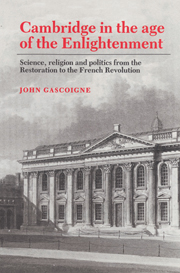 Cambridge in the Age of the Enlightenment
Cambridge in the Age of the Enlightenment Book contents
- Frontmatter
- Contents
- Acknowledgements
- Abbreviations
- Note
- Introduction
- PART ONE THE ‘HOLY ALLIANCE’ IN GESTATION, 1660–88
- 1 Restoration, religion and reaction
- 2 Cambridge and the latitude-men
- 3 Restoration Cambridge and the ‘new philosophy’
- PART TWO THE ‘HOLY ALLIANCE’ PROCLAIMED, 1689–1768
- PART THREE THE ‘HOLY ALLIANCE’ QUESTIONED, 1769–1800
- Epilogue
- Bibliography
- Index
2 - Cambridge and the latitude-men
Published online by Cambridge University Press: 24 August 2009
- Frontmatter
- Contents
- Acknowledgements
- Abbreviations
- Note
- Introduction
- PART ONE THE ‘HOLY ALLIANCE’ IN GESTATION, 1660–88
- 1 Restoration, religion and reaction
- 2 Cambridge and the latitude-men
- 3 Restoration Cambridge and the ‘new philosophy’
- PART TWO THE ‘HOLY ALLIANCE’ PROCLAIMED, 1689–1768
- PART THREE THE ‘HOLY ALLIANCE’ QUESTIONED, 1769–1800
- Epilogue
- Bibliography
- Index
Summary
Both within Cambridge and in the Church at large the restored high church clergy directed particular animosity at those divines who justified their past allegiance to the Church of the Interregnum and their present loyalty to the restored Church of England by maintaining that they were remaining true to the basic tenets of Christianity even though they might compromise on inessentials. The high churchmen's label for such divines was the ‘latitude-men’ or ‘latitudinarians’, a word (as the sympathetic Glanvill put it) ‘that signifies compass or largeness, because of their opposition to the narrow stingy Temper then called Orthodoxness… But afterward among them that knew not those persons, it came to be taken in a worse sense, and Latitudinarian went for one of a large Conscience and Practice’ (Cope, 1954: 273).
While an apologist for the latitudinarians like Gilbert Burnet could describe them as a new sect of men who ‘loved the constitution of thé church, and the liturgy, and could well live under them: but they did not think it unlawful to live under another form’ (G. Burnet, 1897–1900, 1: 335), to their opponents they appeared to be a Trojan horse within the citadel of restored Anglicanism: as late as 1755 the nonjuror, George Smith, characterised them as ‘men, who though they enjoyed her [the Church of England's] Preferments were never truly of her, being only bodily within her Walls, but in Heart and Wish in the Camp of the Adversary’ (1755: 10).
- Type
- Chapter
- Information
- Cambridge in the Age of the EnlightenmentScience, Religion and Politics from the Restoration to the French Revolution, pp. 40 - 51Publisher: Cambridge University PressPrint publication year: 1989


